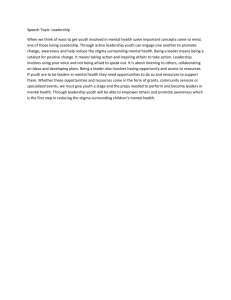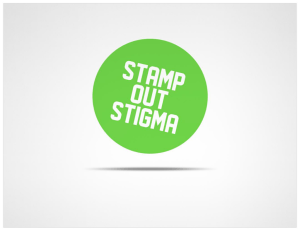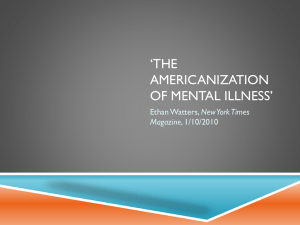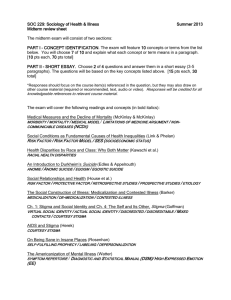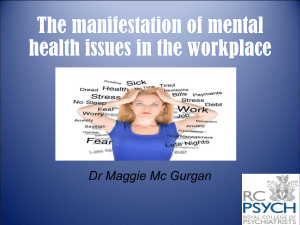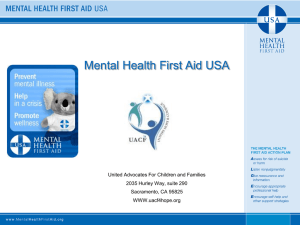Personal contact
advertisement
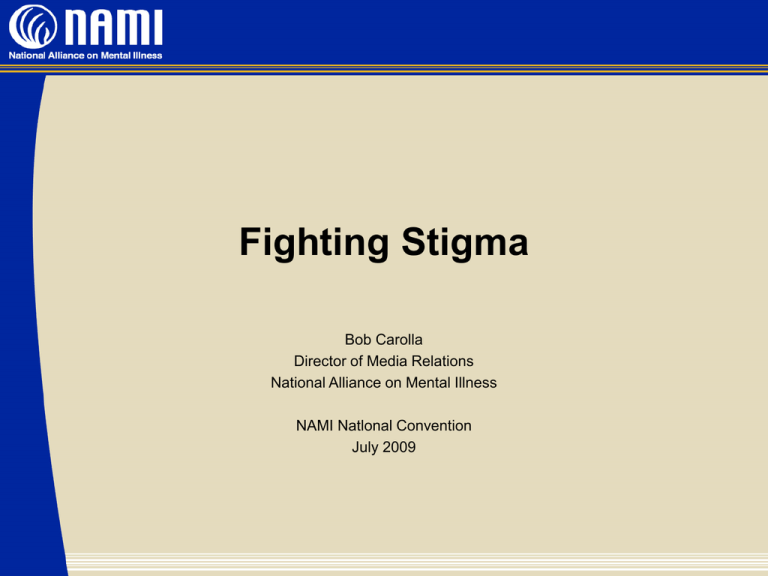
Fighting Stigma Bob Carolla Director of Media Relations National Alliance on Mental Illness NAMI Natlonal Convention July 2009 Definitions Stigma is imposed by others “Deriving from a condition which the target of the stigma either did not cause or over which he has little control.” --Gerhard Falck, sociologist, historian • archaic : a scar left by a hot iron: a brand • a stigmata plural : bodily marks or pains resembling the wounds of the crucified Jesus • An attribute, behavior, or reputation which is socially discrediting in a particular way: it causes an individual to be mentally classified by others in an undesirable, rejected stereotype rather than in an accepted, normal one. Definition U.S Surgeon General’s Report on Mental Health (1999), Chapter One http://www.surgeongeneral.gov/library/mentalhealth/home.html • “Stigmatization of people with mental disorders has persisted throughout history. Bias, distrust, stereotyping, fear, embarrassment, anger, and/or avoidance manifest it. Stigma leads others to avoid living, socializing or working with, renting to, or employing people with mental disorders, especially severe disorders such as schizophrenia. • It reduces patients' access to resources and opportunities (e.g., housing, jobs) and leads to low self-esteem, isolation, and hopelessness. It deters the public from seeking and wanting to pay for, care. • In its most overt and egregious form, stigma results in outright discrimination and abuse. More tragically, it deprives people of their dignity and interferes with their full participation in society…” • “Why is stigma so strong despite better public understanding of mental illness? The answer appears to be fear of violence…but the overall likelihood of violence is low… the overall contribution of mental disorders to the total level of violence in society is exceptionally small.” Perception of Violence Distancing US Surgeon General’s Report “Are people with mental disorders truly more violent? Research supports some public concerns…but the overall likelihood of violence is low…the overall contribution of mental disorders to violence is exceptionally small. One series of surveys found that selective media reporting reinforced the public’s stereotypes linking violence and mental illness and encouraged people to distance themselves from those with mental disorders”. Two Kinds of Stigma Structural • • • • • • • Unfair discrimination Insurance Housing Employment Voting restrictions Lack of public investment Lack of access to health care The Other Kind Attitudes—popular culture • • • • News media Entertainment industry (TV, movies, games) Advertising Commercial products 5 Strategies Each one reinforces others • • • • • Praise Protest Personal contact Public Education Partnership Praise Encourage and reinforce those “who get it right” • Accuracy • Balance • Compassion • Personal letters • Letters to editors • Awards—national, state and local Protest NAMI StigmaBusters www.nami.org/stigma • Focus on popular culture (TV, etc.) • Grassroots reports; monthly alerts • Virtual network Stigma “Red Flags” • • • • • • • • • Context Inaccuracy Stereotypes Portrayed only as antagonists or villains Linkage to violence Language (“wacko”; referring to a person) Devaluation (trivialization) Butt of jokes Offensive or insensitive symbols (e.g., straitjackets) Protest Personal contact—education But protest does not necessarily mean changing minds • • • • • • Sensitize Embarrass Create pressure from others Cause the source to think twice the next time Change behavior rather than attitude Opportunity for a “teaching moment” for broader public Protests: Pick Battles Carefully • • • • • • Priorities Context Most outrageous cases Choose: private vs. public High public profile may be a “teaching opportunity” Opportunity for leverage through TV or radio commercial sponsors, local stores • Opportunity for positive results • Don’t make things worse by publicizing something that is mostly being ignored Where does humor end and stigma begin? Protest Results may be limited or incremental • • • • • Contact—but no more Apology—but no more Discontinuation Makes amends Partnership • • • • Be firm, but polite Private dialogue may be better than public protest Give an adversary a way to save face Find a compromise—call it a victory Crazy for You Bear Valentine’s Day 2005 Local controversy became national Media attention = “teaching moment” Apologized and promised to make no more But advocates wanted sales to stop immediately Governor spoke out Bear sold out CEO forced off hospital board Now a $500+ collector’s item on E-bay Who won? New Jersey Radio “She’s a wacko…Give her a straitjacket and tell her to take her happy pills.” Johnny Shock on the Morning Show [Not his real name or quote] • Formal letter to company president and station manager • Press release or statement (optional) • Request for meeting No call for Johnny to be fired • No call for a boycott • Letters, e-mails and phone calls • Contacts to commercial advertisers • Local business suspended advertising • Local car dealer called CEO with personal story about his daughter • Specific requests in meeting: apology and make amends • Produce and air public service announcements (PSAs) • Sponsor annual fundraising or public awareness event Sample Protest Letter Dear Mr. Station Manager: I want to protest Johnny Shock’s statement on the Morning Show on May 1, 2008 that used offensive language and cruel stereotypes about mental illness to make fun of Gov. ABCD’s wife. Mental illness is not a joke. It is a public health issue. One in four Americans experience mental illness in their lifetimes. The US Surgeon General has declared that stigma and discrimination are a major reason people often don’t get help when they need it. I cannot believe WXYZ-FM would tolerate stigma and discrimination against any racial, ethnic or other disability group. Do you make fun of cancer patients? Add a short personal paragraph: e.g., I have lived with major depression…My son is 15 and lives with bipolar disorder…This is what stigma has done to my family…Why would WXYZ-FM ever want to make fun of it owns listeners? Be one of good guys. Johnny Shock should apologize. WXYZ-FM should undo the damage it’s caused.. Help sponsor a public education campaign about mental illness. Donate PSAs. Interview people about recovery on one of your shows. Sincerely, NAMI Member cc: NJ Human Rights Commission Violent Tragedies Sometimes it’s appropriate to comment • • • • Respond to media calls Press release or statement to members Letters to editors Op-ed articles Keep purpose in mind • Express shared grief and concern • Provide balanced perspective—reduce stigma • Focus media attention on broader, deeper issues Violent Tragedies Basic message – – – – – We extend our sympathy It is essential to understand the nature of mental illness and what went wrong US. Surgeon General has reported that likelihood of violence by people with mental illness is actually low. “The overall contribution…to the total level in society is exceptionally small.” Acts of violence are exceptional. A sign that something has gone terribly wrong. Questions to ask media to pursue: • • • • • • • • • Was there an actual diagnosis? What was the full medical history? Did the person—or person’s family—seek treatment? Was it denied or delayed? Where seen? By whom? How often? Was treatment coordinated among different professionals? Was there a case manager? Taking medication? If not, why not? Substance abuse? What events may have triggered the psychiatric crisis? Did family members receive education and support? Personal contact The face of mental illness Consumer presentations www.nami.org/ioov NAMIWalks www.nami.org/walks
